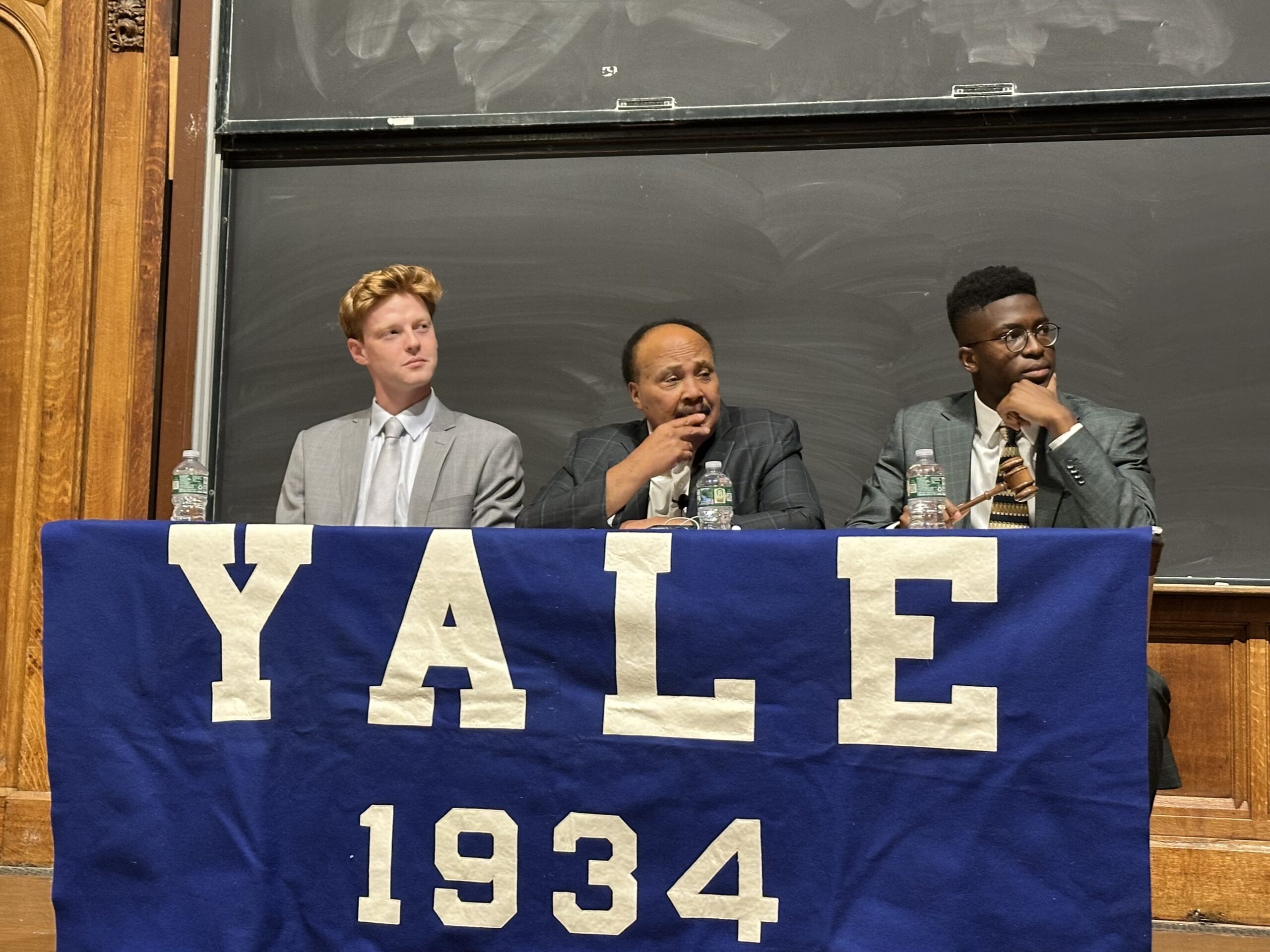Yale Political Union attendees challenge King’s son on nonviolence
Martin Luther King III, a human rights activist, argued in favor of the resolution “violence is never the answer” at the first Yale Political Union debate of the year.

Courtesy of Jennifer Gold
Martin Luther King III argued for nonviolence in front of an audience of about 300 people at the Yale Political Union’s first debate of the school year, but most attendees were not persuaded.
In a 35-minute speech at the Tuesday evening debate, the son of Martin Luther King, Jr. spoke about his personal experiences with violence, citing his father’s assassination when he was ten years old and the shooting of his grandmother in a church.
“Maybe I would be justified in believing an eye for an eye and a tooth for a tooth. The problem with that is it would leave most of us without eyes or teeth,” King said.
But at the end of the debate, attendees voted 55–28 against the statement “violence is never the answer,” with one voter abstaining.
Consistent with all opening Yale Political Union debates of the semester, the event commenced with announcements from the chairs of the seven parties, who urged attendees to join their respective parties.
After a welcome from YPU President Brennan Columbia-Walsh ’26 and thunderous stomping from attendees, King III began his speech by proclaiming that he was “duly entertained” by the announcements from the party chairs.
Throughout the evening, King continuously mentioned current violence occurring around the world, including the wars in Gaza and Ukraine, policing and “unconstitutional” crackdowns on American protestors. King credited the success of his father’s leadership to his practice of “disciplined non-violence” and urged students to practice civility with those who hold different beliefs than they do.
Though unrelated to the resolution, King also dedicated a significant portion of his speech to voicing disappointment with the lack of due process for immigrants in the U.S. and arguing for the importance of diversity, equity and inclusion. His remarks about the latter topic drew a loud mix of stomping and scattered hissing from attendees, indicating both strong agreement and some disdain among audience members.
The event, moderated by Columbia-Walsh and YPU Speaker Richie George ’27, featured two additional student speakers arguing King’s side, and three opposing.
Kai-Shan Kwek-Rupp ’28, the first student to speak against the resolution, pointed to the Haitian Revolution as an example of when extreme subjugation by the oppressor warranted a violent uprising.
“Recourse is not a fast process; it’s a slow, painstaking one that requires great leaders, but the moral arc of the universe is long and it bends towards justice,” Kwek-Rupp said.
Kwek-Rupp also referred to the phrase “no justice, no peace,” explaining that violence may be used when oppressed groups have no other alternative than violence to escape.
Abhinay Lingareddy ‘26 argued that violent revolutionaries often have their flaws after toppling regimes, and by giving in to the oppressors, the revolutionaries often become oppressors themselves.
He urged the audience to reject violence, no matter how practical it may seem. Although admitting that non-violence may not lead to freedom or power, he claimed that one must follow a higher intrinsic morality.
“I’d rather be non-violent and die than be violent and alive,” Lingareddy said.
Abby Nissley ‘28 discussed the non-violent core of Anabaptism, a Christian movement that believes candidates for baptism must request to be baptized and openly confess their faith in Christ. She argued that Anabaptists should live their lives according to Jesus Christ, which means refraining from politics due to their inherent violence.
The last two speakers discussed placing limits on violence and recognizing the implicit violence embedded in state power.
In his closing remarks, King reemphasized the importance of redistributing wealth and concluded that “the future is in good hands” after hearing the student speeches.
The YPU is the oldest collegiate debate society in the U.S., founded in 1934.
Correction, Sept. 21: A previous version of this article misspelled the name of a student speaker at the debate. She is Abby Nissley, not Nissely.







